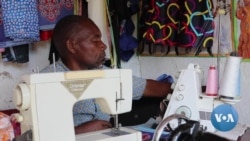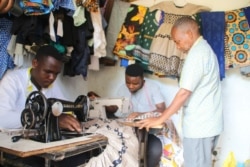BLANTYRE — There are an estimated 100,000 Malawian migrant workers in South Africa, driven there by low incomes at home and the prospect of better jobs abroad. But a European Union-sponsored project is trying to reduce the number of Malawians leaving the country, and encourage migrants to return, by offering job training for self-employment.
After years of struggling to feed his family, tailor Jeffrey Phanga went to South Africa in 2012 in search of better pay. But, like many Malawian migrant workers, his five-year stay in Johannesburg did not go as well as he'd hoped.
"For the first three years, my working pattern was on and off; I couldn't find a proper job. Things did not work as expected," he said.
In 2016, Phanga's employers at a state high school found out he was undocumented and fired him, along with six other illegal Malawians working as cleaners.
Instead of struggling for work in South Africa, he returned home and started his own business, thanks to a project run by the International Organization for Migration.
"The target is 500 Malawi nationals to be received back home," said Nana-Ama Gyapomaah Oppon, projects officer for IOM. "At the moment we have received 436, and we have been able to assist 241 with their livelihood projects."
The European Union-funded project helps migrant workers stranded in South Africa return home and get job training in poultry farming and other trades.
The project helped Phanga open a tailoring shop in Blantyre, where he also trains others like him.
"I don't have plans to migrate, that's why I am making sure to find a means to earn a living (here)," said trainee Henry M'Baya. "This is because the owner of the place has been there (in South Africa), so he tells as us about the good and bad of going abroad."
Xenophobic attacks this year in South Africa spurred some Malawians to return home, but an estimated 100,000 or more are still working in the country.
Despite steady economic growth, Malawi remains one of the world's poorest countries, with about 80 percent of people limited to working on farms.
"You know there is a problem of unemployment. It's everywhere," said Hudson Mankhwala, chief director in the Malawi Ministry of Homeland Security. "But, back in Malawi, we still have a lot of youth, even graduates from colleges, they can't get jobs."
While the IOM project is helping to expand the range of jobs, Malawi officials say they are also founding community, technical, and training colleges.
Their success will be measured by the number of Malawians who stay in the country or return home to make a living.







